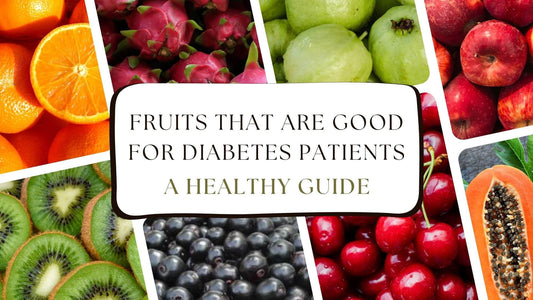
Fruits that are Good For Diabetes Patients: A Healthy Guide
The scope of modern diabetic medications lies in stabilizing rising blood sugar levels but is incompetent enough to deal with complications arising in the heart, pancreas, kidneys, and nerves.
A diabetic person needs support from the nutrients and nutritional factors that are available in specific fruits with a low Glycemic Index.
Researchers are conducting extensive research to explore the potential role of fruit antioxidants in preventing oxidative stress, which is the primary cause of diabetes or high blood sugar conditions, and its associated complications.
Understanding the different types of diabetes — type 1, type 2, gestational diabetes and prediabetes — can help make dietary choices more effectively.
Can Diabetic Patients Eat Fruits?
Fruits are the best alternative available when you feel hungry. Being a diabetic patient you must have encountered a situation when you don’t feel full. Fruits can definitely help with that.
Also, Fruits are a rich source of carbohydrates, essential vitamins and minerals, and fibers that help make a balanced diet. There are Certain nutrients that can only be found in fruits.
What is the Glycemic Index and Why Does It Matter?
The glycemic index is the information in numeric form about the glucose level that may be present in fruits, vegetables, and cereals.
With the help of this specific measurement scale, nutritionists plan the diet chart for any diabetic.
A GI of 55 or less is considered to be diabetes-friendly, which may be existing in fruits, grains, and vegetables.
List of Glycemic Index Fruits
1. Citrus Fruits: High in Fiber and Vitamin C
1.1 Grapefruits
Its glycemic index is 26, which makes it suitable for any diabetic patient. It cannot raise blood sugar. Instead, the abundance of fiber and antioxidants in it may inhibit the absorption of sugar and shield cells from oxidative damage.
1.2 Oranges
When taken as a whole fruit rather than its juice, it might have a quicker anti-diabetic effect on a person suffering from diabetes and its associated complications. Its high fiber content and moderate glycemic index, ranging between 43 and 52, may not trigger blood sugar elevation.
1.3 Lemons
The glycemic index is around 20, and that indicates that there is no risk in consuming lemon. It is high in nutrients and fiber, which makes the diabetic rely on it to regulate the metabolism of body. Lemons' high vitamin C content and antioxidant content may help gain control over stress and obesity .
1.4 Sweet Limes
Even though it might be sweeter than most lemons or limes, it might not cause a spike in blood sugar. Since its glycemic index ranges from 40 to 53, diabetics can depend on it to be consumed regularly during the monsoon.
2. Berries: Packed With Antioxidants and Low GI
2.1 Jamuns
It is considered a superfood for any diabetes patient because of its natural potency to increase insulin sensitivity and renew the pancreatic beta cells. Known as the Indian black cherry, it has a glycemic index of 25, and its potassium, iron, protein, magnesium, and other nutrients may help diabetics whose health is severely impaired due to a high sugar spike.
2.2 Strawberries
It's high in antioxidants to nourish the deteriorating health conditions of diabetics. It may be another fruit on which every diabetic can rely because of its low glycemic index of 40. and low calories. It may prevent both sugar spikes and weight gain.
2.3 Cherries
It is another reliable fruit for diabetics whose glycemic index is at 20. It may help in keeping blood sugar levels under control. Its abundance of antioxidants may help in recovering insulin loss and promoting healthy weight loss.
2.4 Cranberries
If eaten fresh and raw, these fruits can surely lower your increasing blood sugar level. Its glycemic index is 45, which may give a boost to the diabetic person by increasing insulin sensitivity and stimulating weight loss.
3. Stone Fruits: Provide Vitamins and Are Moderate GI Choices
3.1 Peaches
As high blood sugar levels tend to cause nutritional deficiencies in the body, the consumption of peaches may nourish your body with vitamins A, C, potassium, and iron. The glycemic index of 28 in peaches may not cause a blood sugar spike.
3.2 Plum
Plums, with a moderate glycemic index (GI) of 39-53, have a gentle effect on blood sugar levels due to their fiber, which slows sugar absorption. Its high percentage of vitamin A, vitamin C, and vitamin K may nourish the health of diabetics.
3.3 Nectarines
It may not increase the sugar levels as its glycemic index is 43. It will further nourish the diabetic’s health with Vitamin C and Vitamin B and boost immunity levels. It may help in revitalizing the skin and strengthening the gut.
3.4 Green Almonds
These fruits are low in glycemic index with a value of 15, and these fruits may not increase the blood sugar level if eaten regularly. Even when they turn ripe and dry, the seeds inside the fruits are eaten in the form of dry fruit or nuts. In whatever form, almonds may keep your body well nourished with Vitamin E, C, Iron, Calcium, and Magnesium.
4. Fleshy Fruits: Low GI and Rich in Fiber
4.1 Apples
It may help in maintaining the health of a diabetic person positively. Its glycemic index of 39 may not impact causing blood sugar elevation. It will improve digestive health with its richness of soluble and insoluble fiber. It may also promote healthy weight loss.
4.2 Kiwis
Depending on the variety of Kiwis, the glycemic index may range between 48 and 51. It may help in keeping high blood sugar at optimum levels. This is a highly resourceful food that can provide you with additional fiber that you can get maximum from its brown skin.
4.3 Pomegranates
The fleshy part covers the seed of the pomegranate, whose high fiber content slows down the absorption of sugar. It may control the rise in sugar level whose glycemic index is between 18 and 53.
4.4 Guava
It is the best food for diabetics whose blood sugar levels are too high. Guavas have a glycemic index of 12 to 24, and because of their high fiber content, their sugar may not be absorbed into the bloodstream too quickly.
4.5 Papaya
Fresh and ripened papaya will serve with a moderate glycemic index of 59 to 60, and unripe one is of 23 glycemic index. Both the ripe and unripe ones are high in fiber and form an ideal diet for diabetics.
5. Exotic Fruits: Nutrient-dense and Low-carb
5.1 Dragon
It helps in blood sugar control, which grows in the subtropical and tropical zones of India, Southeast Asia, and South America. The softer part of this fruit is eaten, which is inside the thorny and scaly skin. It is nutritionally rich with vitamins C and B and fiber to keep your metabolism active.
5.2 Passion Fruit
Any diabetic may benefit from eating this specific fruit, as its glycemic index is 30. This fruit's high fiber content might make it harder for the blood to absorb sugar. Its pulp and seeds It is high in water and low in carbs, which may make you feel full.
5.3 Lychee
Its soft flesh inside the skin has a juicy and sweet taste, which may suit even any diabetic. Its natural sugar, inositol, would not contribute to an increase in sugar levels. Rather, it may contribute to regulating sugar levels whose glycemic index is around 50.
5.4 Avocado
It is supposed to be a good choice for any diabetic person whose glycemic index is 40. It may not cause an elevation of the sugar levels in the body. Due to its high fiber content and low sodium, sugar, and carbohydrate content, it may support heart and brain health.
5.5 Jackfruit
Its glycemic index is between 50 and 60, and although it has natural sugars, fiber, and proteins, it might not raise blood sugar levels in the body very quickly. However, eating in moderation is preferable, particularly if you're also eating carbs.
6. Other Fruits That Can Be Diabetes-friendly
6.1 Garcinia Indica
Though exact information on the GI score is not available, its richness in Vitamin C and low in sugar may enable healthy weight loss.
6.2 Figs
For any diabetic, it would be safe to eat fresh figs whose glycemic index is not more than 35.
6.3 Grapes
Depending on the ripeness of the fruit, the glycemic index may differ; however, fresh ones’s glycemic index ranges between 43 and 53.
6.4 Prunes
It possesses healthy carbohydrates capable of satisfying diabetics’s appetites with a glycemic index of 29.
6.5 Olives
Despite its 15 glycemic index, it should not be consumed raw but cooked as chutney, blended with preservatives, or added to salads.
Why Should One Need to Have Fruit in Our Diet?
Fruits contain natural sugar fructose. Fruits are also a rich source of fibers. That helps in controlling cholesterol and sugar levels of the body. Fibre also helps in maintaining healthy weight, a crucial concern that the diabetic patient faces.
Fruits are a good source of minerals and vitamins which are important for healthy body function.
Also, Fruits contain certain compounds like phytochemicals and antioxidants. These compounds help fight against major diseases like cancer, stroke, cancer etc.
How Much Can You Take?
As per any dietitian’s opinion, a diabetic must include 60% to 70% of low glycemic index fruits and medium GI of moderate amounts to keep the elevated sugar levels in control.
Fruits That Are High in Natural Sugars
1. Watermelon
Watermelon glycemic index is between 72 and 80, which may not be safe with any diabetic person.
2. Overripe Mangoes
Avoiding overripe mangoes would be a better choice because of their high sugar content.
3. Pineapples
Avoid consuming canned or juiced pineapples or ripe pineapples whose glycemic index can reach 73.
4. Ripe Bananas
Avoid consuming too-ripe bananas, which may have a glycemic index of 62.
5. Cherries
Eating in excess may increase blood sugar levels even though its glycemic index may be 20.
6. Ripe Lychees
Excessive consumption of ripe lychees can raise blood sugar levels, which is associated with a moderate glycemic index of 50.
7. Chikoo (Sapodilla)
It has a glycemic index of 57, considerably not good enough for anyone who has diabetes.
Conclusion
A registered doctor’s medicines may help stabilize your blood sugar levels but are not capable of reversing diabetes-related complications.
Diabetes can’t be cured. But it is true that you can manage by making some changes in your dietary, lifestyle and Medicines. Ayurvedic medicine for diabetes can help you manage diabetes by controlling blood sugar levels, reducing inflammation, and improving insulin sensitivity.
Many diabetes-friendly fruits belong to the categories of citric, stone, fleshy, and exotic. Such nutritionally dense fruits may help restore energy, fight obesity, and lower cholesterol levels.
FAQs:
Q.1 Is watermelon good for diabetics?
Ans: Though watermelon may hydrate your body, it may not be good during a diabetic condition because of a glycemic level going above 70.
Q2. Are bananas good for diabetes?
Ans: Try eating less ripened bananas—only one or two of small size; otherwise, a glycemic index of above 60 can be risky in high sugar conditions.
Q3. Is beetroot good for diabetes?
Ans: Beetroot should be eaten in moderate amounts because its glycemic index ranges between 61 and 64.
Q4. Is honey good for diabetics?
Ans: Comparatively, honey is a safer sweetening item than sugar, with a glycemic index of 58.
Q5. Is amla good for diabetes?
Ans: Amla is another diabetes-friendly superfood with a glycemic index of only 15 and is full of antioxidants and Vitamin C.
Q6. Is papaya good for diabetes?
Ans: papaya may not cause sugar to spike faster as its glycemic index goes up from 58 to 61.
Q7. Is coconut water good for diabetes?
Ans: coconut is safe to drink coconut water because it does not have sugar but is high in potassium and other nutrients to strengthen your gut.
Q8. Is jaggery good for diabetes?
Ans: jaggery is not safe for diabetics whose glycemic index may be above 84.
Q9. Can diabetic patients eat dates?
Ans: Though dates possesses natural sweetness, it may not harm the diabetic person as its glycemic index is at 42.
Q10. Is guava good for diabetes?
Ans: Guava glycemic index may vary between 12 and 24, and that’s how it's a safe and nutritious superfood for any diabetic.
Q11. Is corn good for diabetics?
Ans: The glycemic index of corn depends on its category and method of preparation. Normally sweet or boiled corn has a glycemic index between 50 and 55.
Q12. Is jackfruit good for diabetes?
Ans: Even though jackfruit glycemic index is 60, a high percentage of fiber and protein may not cause a sugar spike.
Q13. Is mango good for diabetes?
Ans: Eating mango in small pieces may be safe for any diabetic whose natural sugars and carbohydrates are high.
Q14. Are grapes good for diabetes?
Ans: Grapes are safe enough for diabetics to not cause sugar spikes as their glycemic index goes between 43 and 53.
Q15. Are oranges good for diabetes?
Ans: This oranges may nourish the health of diabetics with various nutrients whose glycemic index does not go beyond 50.
Q16. Is pineapple good for diabetics?
Ans: pineapple glycemic index is between 51 and 73, safe to eat in moderate amounts. Its high fiber content may not quickly allow the absorption of sugar into the blood.
Q17. What are the best fruits for a diabetes patients?
Ans: Here’s a list of some of the best fruits for diabetes patients:-
- Grapefruits (GI: 26)
- Oranges (GI: 43-52)
- Lemons (GI: 20)
- Sweet Limes (GI: 40-53)
- Jamuns (GI: 25)
- Strawberries (GI: 40)
- Cherries (GI: 20)
- Cranberries (GI: 45)
- Peaches (GI: 28)
- Plums (GI: 39-53)
- Nectarines (GI: 43)
- Green Almonds (GI: 15)
- Apples (GI: 39)
- Kiwis (GI: 48-51)
- Pomegranates (GI: 18-53)
- Guava (GI: 12-24)
- Papaya (Ripe: 59-60, Unripe: 23)
- Dragon Fruit (GI: Not specified, generally considered low)
- Passion Fruit (GI: 30)
- Lychee (GI: 50)
- Avocado (GI: 40)
- Figs (GI: ≤35)
- Dates (GI: 42)
- Olives (GI: 15)

Dr. Pooja Verma
Dr. Pooja Verma is a sincere General Ayurvedic Physician who holds a BAMS degree with an interest in healing people holistically. She makes tailor-made treatment plans for a patient based on the blend of Ayurveda and modern science. She specializes in the treatment of diabetes, joint pains, arthritis, piles, and age-related mobility issues.





